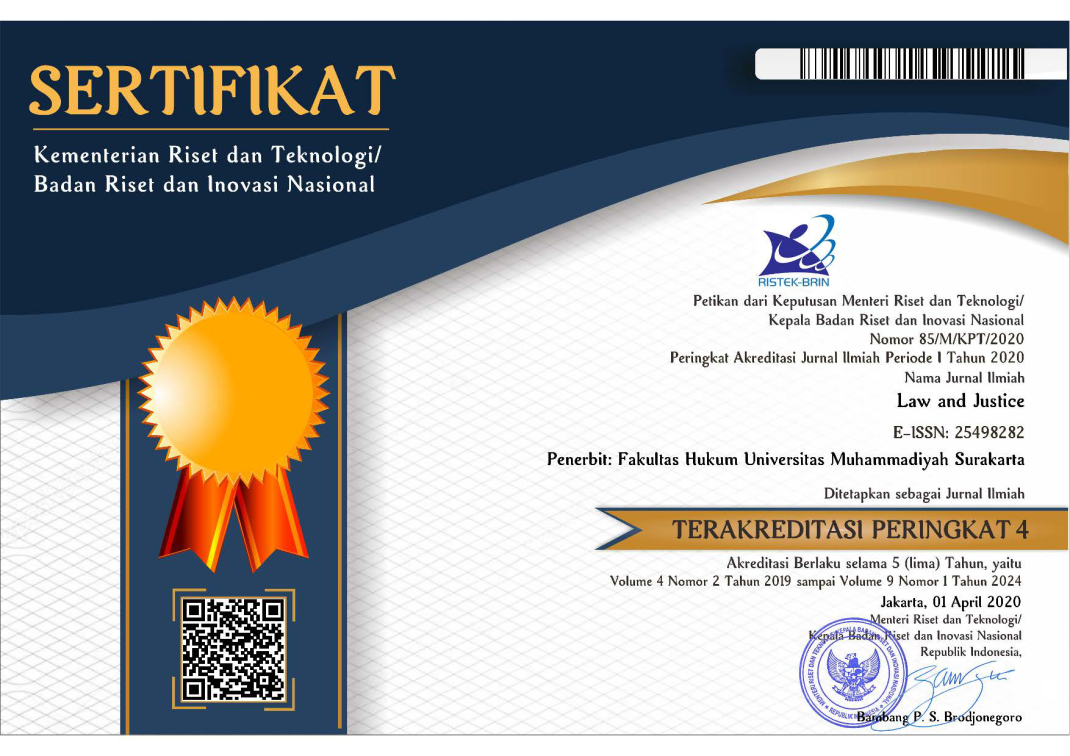Legal Policies on Welfare Approaches in Forest Management in Indonesia: : Policy Study at Perum Perhutani KPH Saradan
DOI:
https://doi.org/10.23917/laj.v8i1.1693Keywords:
Forestry, Policy, Saradan, Welfare, Kehutanan, Kebijakan, KesejahteraanAbstract
Penelitian ini bertujuan untuk mengkaji kebijakan Perum Perhutani KPH Saradan dalam mengadopsi kebijakan Pengelolaan Hutan Bersama Masyarakat (PHBM) sebagai kebijakan kehutanan dengan pendekatan baru, yaitu meningkatkan kesejahteraan masyarakat yang tinggal di sekitar hutan dan sekaligus melestarikan hutan. Penelitian ini merupakan penelitian non-doktrinal dengan pendekatan kualitatif, yaitu sesuatu dilihat dari sudut pandang orang yang diteliti (informan). Lokasi penelitian berada di wilayah kerja Perum Perhutani KPH Saradan. Jenis data dalam penelitian ini terdiri dari data primer dan data sekunder. Data primer diperoleh dari wawancara dengan responden yang diambil dengan metode purposive sampling dan dianalisis dengan analisis kualitatif. Berdasarkan hasil penelitian dan diskusi, dapat disimpulkan bahwa kebijakan PHBM memiliki tujuh tujuan, yaitu: perencanaan dan pelaksanaan kegiatan yang lebih fleksibel, peningkatan tanggung jawab Perum Perhutani (KPH Saradan) terhadap keberlanjutan fungsi dan manfaat hutan, peningkatan peran dan akses masyarakat desa hutan (MDH) dan pemangku kepentingan pengelolaan SDH, penyesuaian PHBM dengan pembangunan daerah, peningkatan sinergi dengan Pemerintah, peningkatan usaha produktif sehingga masyarakat mandiri dan mendukung peningkatan Indeks Pembangunan Manusia (IPM). Implementasi kebijakan PHBM dalam konsepnya adalah pengelolaan hutan bersama masyarakat, yaitu prinsip kerjasama, pengelolaan bersama, dan tanggung jawab bersama. Kebijakan dengan pendekatan kesejahteraan ini juga mengambil jalur kesediaan untuk berbagi hasil hutan kayu dan non-kayu dengan masyarakat Desa Hutan (MDH) yang sebelumnya telah dilakukan dan memiliki konsep pertanian di area hutan sehingga hutan dapat dimanfaatkan untuk kesejahteraan tanpa menyebabkan kerusakan hutan.
Kata Kunci: Kehutanan, Kebijakan, Saradan, Kesejahteraan
This study aims to examine the policies of Perum Perhutani KPH Saradan adopting the Community Forest Management (PHBM) policy as a forestry policy with a new approach, namely increasing the welfare of the people living around the forest and preserving forests on the other hand.
This research is a non-doctrinal research with a qualitative approach, that is, something is seen from the point of view of the person being studied (informant). The research location is in the working area of Perum Perhutani KPH Saradan. The type of data in this study consists of primary data and secondary data. Primary data obtained from interviews with respondents from sampled with the purposive sampling method and analyzed with qualitative analysis.
BerdaBased on the results of the research and discussion, it can be concluded that the PHBM policy has seven objectives, namely: more flexible planning and implementation of activities, increasing the responsibility of Perum Perhutani (KPH Saradan) for the sustainability of forest functions and benefits, increasing the role and access of forest village communities (MDH) and stakeholders. holders of SDH management, aligning PHBM with regional development, increasing synergy with the Government, increasing productive businesses so that the community is self-sufficient and supporting the improvement of the human development index (IPM).
The implementation of the PHBM policy in its concept is community forestry, namely the principles of co-operation, co-management and co-responsibility. The policy with this welfare approach also takes the path of willingness to share timber and non-timber forest products with the Forest Village (MDH) community which was carried out previously and has the concept of agriculture in forest areas so that forests can be utilized for welfare without causing forest damage.
Keywords: Forestry, Policy, Saradan, Welfare.
Submitted
Accepted
Published
Issue
Section
License
Copyright (c) 2023 Law and Justice

This work is licensed under a Creative Commons Attribution 4.0 International License.










